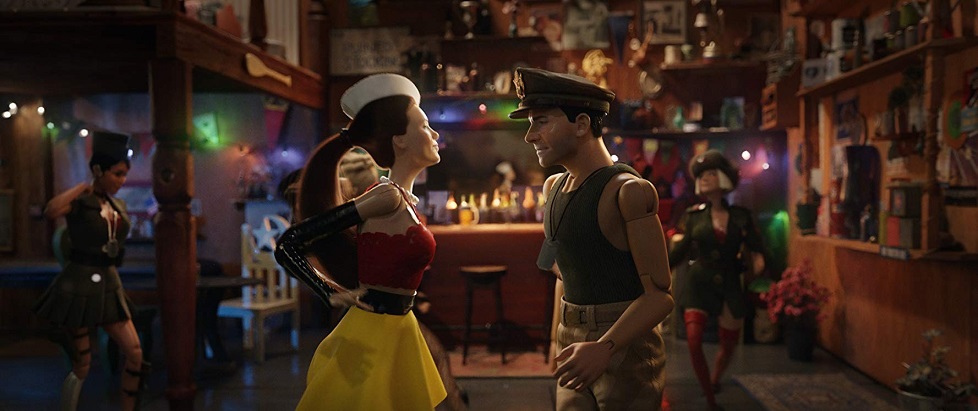
Welcome to Marwen

This column is a reprint from Unwinnable Monthly #111. If you like what you see, grab the magazine for less than ten dollars, or subscribe and get all future magazines for half price.
———
Every week, Megan Condis and a group of friends get together for Documentary Sunday, a chance to dive into the weird, the wacky, the hilarious and the heartbreaking corners of our culture. This column chronicles all of the must-watch documentary films available for streaming.
———
Spoilers for Welcome to Marwen, though if the box office receipts are any indication, you probably don’t care.
Welcome to Marwen (Zemeckis, 2018) debuted just before Christmas Day to disappointing ticket sales and a critical response ranging from disinterest to outright disdain. According to the trailer, Welcome to Marwen is based on the life story of Mark Hogancamp (played by Steve Carell), who sustained major brain damage and substantial memory lost when he got jumped by five guys one night outside his local bar. In order to grapple with what happened to him, Hogancamp devised a unique form of therapy for himself in the form of a vast and intricate photographic storytelling project set in the fictional Belgian city of Marwen during World War II. Hogancamp builds Marwen from scratch in his backyard garden and populates it with action figures representing himself and his friends. The town is plagued by violent Nazi thugs who closely resemble the men who beat Mark nearly to death in the real world, but luckily, Mark’s alter-ego, Captain Hogie, and his squadron of tough, beautiful women (doll versions of his supportive co-worker, his physical therapist, his home care nurse, the owner of the local hobby shop, his kindly neighbor, and, in an attempt at a joke that falls somewhat flat, his favorite porn star) have what it takes to beat them back and protect the town.
However, the trailer also works extremely hard to omit a few salient facts about the attack, thereby undermining the heavily implied moral of the story that “nobody deserves to be abused for being different.” You see, the inciting incident of the attack was a drunken admission that Mark occasionally enjoyed wearing women’s shoes. While the film centers on Mark’s slow internalization of the idea that the attack was not his fault, no matter how drunk he may have gotten or what he was or wasn’t wearing (the parallels to the sexist, victim-blaming discourse around sexual assault and rape are quite stark) the careful excision of these parts of his identity from the trailer suggests that Zemeckis was more than a little bit worried about whether filmgoers would agree. It almost feels as though the film is ashamed of its own protagonist. For example, the movie goes to great lengths to point out that on the night in question, Hogancamp was sporting a rather drab pair of men’s tennis shoes, not a pair of sexy stilettos. One wonders whether some focus group discussion about whether or not Mark had “invited” his assault by flaunting his footwear left the filmmakers in the difficult spot of trying to market the film towards an audience that might not be trusted to take a tolerant view of its hero.

Zemeckis also takes it upon himself to “clean up” Hogancamp’s art. The real-life version of Marwen is beautiful and meticulously detailed, but it also wears its handmade aesthetic with pride. Zemeckis’s version, on the other hand, is a technological marvel that uses a mixture of live performances and CGI to create eerily life-like living dolls teetering on the border of the Uncanny Valley. As a result, much of the charm of Hogancamp’s art winds up being lost as lovingly crafted physical objects are transformed into mere videogame avatars.
Luckily, those of you who (wisely) choose to skip Welcome to Marwen can still enter Hogancamp’s world via the 2010 documentary Marwencol (Malmberg). Marwencol is simply a series of interviews with Hogancamp, some of which focus on his real world struggles with reacclimating to the world following his attack and some of which focus on the ongoing soap opera taking place within his fictional town. One of the first things one notices about the documentary version of Hogancamp’s artistic process is that it represents much more than mere escapism. It is literally the only form of therapy available to him, as he was left to deal with completing his rehab on his own when his Medicade money ran out after just a few months of physical and emotional therapy. His town is ingenious and delightful, but it also represents a desperate form of improvisation by a man looking for a way to process events that have, as he somewhat cavalierly puts it, “been kicked out of his head.” His strategy is quite brilliant. The dolls give him the ability to re-enact what happened to him on a smaller scale, 1/6th that of real life to be exact, and in a way that is entirely under his control. But it is only necessary in the first place because of a series of catastrophic societal failures. The first created a social environment in which a bunch of bigots felt entitled to beat him within an inch of his life because he chose not to hew closely to pre-approved forms of heteronormative masculinity. The second created a healthcare system that was capable of callously abandoning him during a crucial point in his recovery.
Welcome to Marwen turned Hogancamp’s life into something that is just a little bit too antiseptic, just a little bit too wholesome, and in doing so robs the artist of the agency his art helped him to reclaim. It, too, is an act of social violence, although one that has been coated in a fine dusting of Hollywood movie magic. Its refusal to engage with the systemic issues that run through every aspect of Mark’s story turns an opportunity to reflect on how our country is ill-equipped to accommodate difference into a chance for us to pat ourselves on the back for how tolerant we are of quirky deviants, so long as they invest their lives into creating enchanting dioramas for us all to enjoy. Marwencol, on the other hand, feels more like a cinematic act of generosity, like the filmmaker and his subject coming together to open wide the doors of Hogancamp’s place of healing to invite the rest of us inside.
———
Megan Condis is an Assistant Professor of Communication Studies at Texas Tech University. Her book project, Gaming Masculinity: Trolls, Fake Geeks, and the Gendered Battle for Online Culture is out now from the University of Iowa Press.




